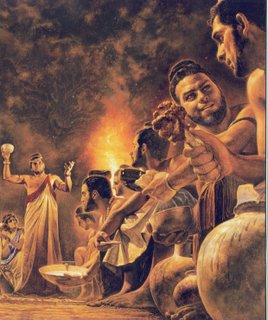Does 1 Samuel 20:6, 29 Refer to a Kispum?
 This image is an artist's representation of a Kispum in an ancient Syrian royal tomb at Qatna. The rite entailed a ceremonial meal focused on the ritualistic sharing of food between the living and the dead. It was a time of communion between all members of a family line, including both the living and their ancestors. The feast was held during the new moon, when the worlds of the living and the dead were believed to draw close.
This image is an artist's representation of a Kispum in an ancient Syrian royal tomb at Qatna. The rite entailed a ceremonial meal focused on the ritualistic sharing of food between the living and the dead. It was a time of communion between all members of a family line, including both the living and their ancestors. The feast was held during the new moon, when the worlds of the living and the dead were believed to draw close.Does David attend such a meal in 1 Samuel 20? The biblical text does not say so explicitely, but at least three bits of evidence seem to point in this direction:
- David speaks of a ritual meal - a sacrifice - involving all his kith and kin (1 Sam 20:6) and it takes place at the "new moon" (1 Sam 20:5). In the ancient Near East, the period of the new moon, when the moon was out of sight down in the underworld, marked a time when the physical world interconnected with the realm of death.
- The ritual takes place back on the family's inherited land ("Bethlehem, his city," v. 6), the place that supports and nurtures the family group and where their ancestors are buried (cf. 2 Sam 17:23, etc.).
- There appears to be a special role for the family's eldest male offspring in the ritual ("my brother has commanded me to attend," v. 29). In many traditional cultures, the eldest son has chief responsibility for continuing the family line. In the biblical world, at Emar it was the bailiwick of the principle heir to invoke the family's ancestors, honor them, and tend to their needs.
There does not seem to be anything necessarily "unfaithful" about what appears to be going on in 1 Sam 20. Take, for example, this fascinating account of contemporary Christian practice in Romania:
"In my country - Romania - there is a day a year called The day of the Deads when people go to church having a basket full of food (usually cake based on boiled wheat) & drink (especially wine) and after a long liturgy - when food and drink is blessed - they start giving it to other people around. Those who receive it should say "Bogdaproste" or something like this. What I know about this ritual is that here we make the kind of food that the dead in our familly would have liked. It is said that what we give goes somehow to the dead loved ones."
0 Comments:
Post a Comment
<< Home